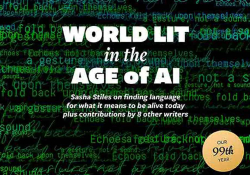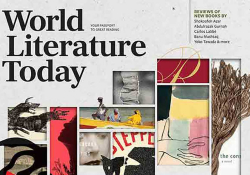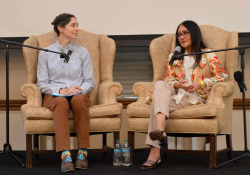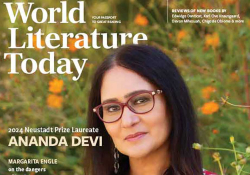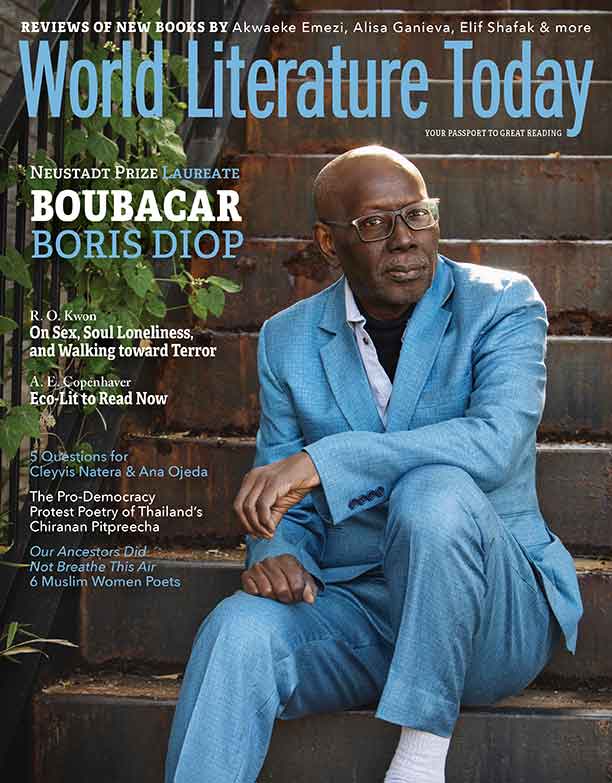Editor’s Note
 IN HIS SPEECH accepting the 2022 Neustadt Prize, Boubacar Boris Diop listed several of his intellectual and literary mentors: Aimé Césaire, Cheikh Anta Diop, Ngũgĩ wa Thiong’o, Cheik Aliou Ndao, Ayi Kwei Armah, and Mongo Beti. In notebook 5 of Diop’s novel Doomi Golo, the grandfather figure, Nguirane, recites a similar litany of “real men” who “command respect”: Cheikh Anta Diop, Amílcar Cabral, Mongo Beti, Samory Touré, Thomas Sankara, and Patrice Lumumba. “Each one of them was a Man of Defiance in his own right,” Nguirane tells Badou, his grandson, “and for that reason and for that reason alone, the white colonizer killed them or at least reduced them to silence.” Also in his acceptance speech, Diop declared: “It must be said that the moment when the writer, alone in front of the white page, is about to produce meaning and emotions, is the moment of their absolute freedom.” Throughout his fiction, Diop’s storytellers insist on the primacy of aesthetic freedom while at the same time embodying defiant truths—ethical, existential, political, and more.
IN HIS SPEECH accepting the 2022 Neustadt Prize, Boubacar Boris Diop listed several of his intellectual and literary mentors: Aimé Césaire, Cheikh Anta Diop, Ngũgĩ wa Thiong’o, Cheik Aliou Ndao, Ayi Kwei Armah, and Mongo Beti. In notebook 5 of Diop’s novel Doomi Golo, the grandfather figure, Nguirane, recites a similar litany of “real men” who “command respect”: Cheikh Anta Diop, Amílcar Cabral, Mongo Beti, Samory Touré, Thomas Sankara, and Patrice Lumumba. “Each one of them was a Man of Defiance in his own right,” Nguirane tells Badou, his grandson, “and for that reason and for that reason alone, the white colonizer killed them or at least reduced them to silence.” Also in his acceptance speech, Diop declared: “It must be said that the moment when the writer, alone in front of the white page, is about to produce meaning and emotions, is the moment of their absolute freedom.” Throughout his fiction, Diop’s storytellers insist on the primacy of aesthetic freedom while at the same time embodying defiant truths—ethical, existential, political, and more.
Such truths, for Diop, never exist in a vacuum: even amidst the moral clarity of his most celebrated novel, Murambi: The Book of Bones, truths must be told to assert their veracity, must be tested communally so that their concentric rings will envelop humanity as a whole, must, like the Sankofa bird, look to the past even as it flies into the future in order for such storied truths to remain viable, through remembrance, for generations to come. (In an aside about Murambi during his keynote speech at the Neustadt Festival—published here on page 50—Diop asserted that the novel “is not a work of the imagination; it is the truth,” punctuating the word “truth” with the force of a griot who brings the full weight of his rhetorical power to bear on a phrase, lest his audience miss the point.) So often, Diop’s novels and stories read like metafictions about the art of storytelling itself, but literature and art are ultimately marshaled in service of the truth, not for art’s sake.
A case in point is Kaveena, Diop’s most recent novel to be translated into English. Two stories compete for the reader’s attention at the beginning of the novel: (1) the story of a “decapitated” African state following a civil war that deposes its president, N’Zo Nikiema, and brings a Frenchman, Pierre Castaneda, to power and (2) the story of a murdered six-year-old girl, Kaveena. Nikiema’s chief of police, Asante Kroma, asserts that the death of Nikiema is “a story worth telling . . . for the future” while he sifts through the notebooks and letters—and “thousands of corpses”—that the psychopathic tyrant has left behind, but the most powerful testimony is the videotape of one murder (Kaveena’s), which was ordered by Castaneda. As the president’s speechwriter, Castaneda tells Nikiema that “words are what drive the world,” but the dying Nikiema reflects that words are “ambiguous, uncertain . . . little blows dealt by life, but so relentless, swirling around in the emptiness, then finding their place, one next to the other.” As is frequently the case in Diop’s work, politicians’ corrupt speech is a scourge on society, whereas the nonverbal witness of characters like Kaveena and the woman in black in Murambi—a Tutsi whose husband and daughter are massacred during the 1994 Rwandan genocide—say more than what either heads of state or writers can ever convey in their “relentless, swirling” words.
In an essay entitled “My Father’s Library,” Diop writes that the French library on his father’s bookshelves, which he absorbed during the day, represented a “sarcophagus of signs,” whereas the Wolof stories recounted by his mother at night ignited in him a “fire of words” that still burns to this day. As a storying truth-teller, Diop captures the fire of the spoken word, bringing light, truth, and life to the written page.
